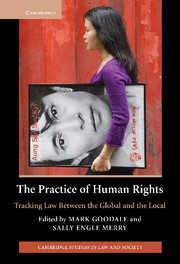Book contents
- Frontmatter
- Contents
- Contributors
- Acknowledgments
- Introduction Locating rights, envisioning law between the global and the local
- PART ONE STATES OF VIOLENCE
- PART TWO REGISTERS OF POWER
- Introduction
- 3 The power of right(s): tracking empires of law and new modes of social resistance in Bolivia (and elsewhere)
- 4 Exercising rights and reconfiguring resistance in the Zapatista Juntas de Buen Gobierno
- PART THREE CONDITIONS OF VULNERABILITY
- PART FOUR ENCOUNTERING AMBIVALENCE
- Conclusion Tyrannosaurus lex: the anthropology of human rights and transnational law
- Index
- References
3 - The power of right(s): tracking empires of law and new modes of social resistance in Bolivia (and elsewhere)
Published online by Cambridge University Press: 29 March 2011
- Frontmatter
- Contents
- Contributors
- Acknowledgments
- Introduction Locating rights, envisioning law between the global and the local
- PART ONE STATES OF VIOLENCE
- PART TWO REGISTERS OF POWER
- Introduction
- 3 The power of right(s): tracking empires of law and new modes of social resistance in Bolivia (and elsewhere)
- 4 Exercising rights and reconfiguring resistance in the Zapatista Juntas de Buen Gobierno
- PART THREE CONDITIONS OF VULNERABILITY
- PART FOUR ENCOUNTERING AMBIVALENCE
- Conclusion Tyrannosaurus lex: the anthropology of human rights and transnational law
- Index
- References
Summary
INTRODUCTION
At the end of Michael Hardt and Antonio Negri's dizzyingly suggestive but frustratingly vague book Empire, the authors take the leap that we all know is coming, but which, given the heights that have come before, we anticipate with a certain amount of dread. After having described what they understand to be a new global socio-political configuration, and having shrouded their analysis in a kind of ominousness, given the fact that Empire emerges through the self-disciplining of millions of individuals around the world, outside of the traditional institutions that can be resisted or even appropriated, they nevertheless go on to predict a revolution by the “multitude” against Empire. It is not the neo-Marxist epistemology that is so unsatisfying about this abrupt end to what is surely one of the most innovatively forethinking works of critical scholarship in recent years, one perfectly and organically embedded in its times. And nor must we necessarily object to the way in which its neo-Marxist social analysis reflects a peculiar transformation since 1989, in which the scientific trappings of dialectical materialism have been replaced by a giddy mysticism, so that the fall of the Soviet system should no longer dampen the “irrepressible lightness and joy of being communist” (2000: 413). Rather, the disappointment with their invocation of revolution is two-fold. First, it is entirely prefigured, rather than established; as I said, we know a prediction of massive system disrupture is coming because we know the theoretical trajectory in which the analysis of Empire is located.
- Type
- Chapter
- Information
- The Practice of Human RightsTracking Law between the Global and the Local, pp. 130 - 162Publisher: Cambridge University PressPrint publication year: 2007
References
- 19
- Cited by

